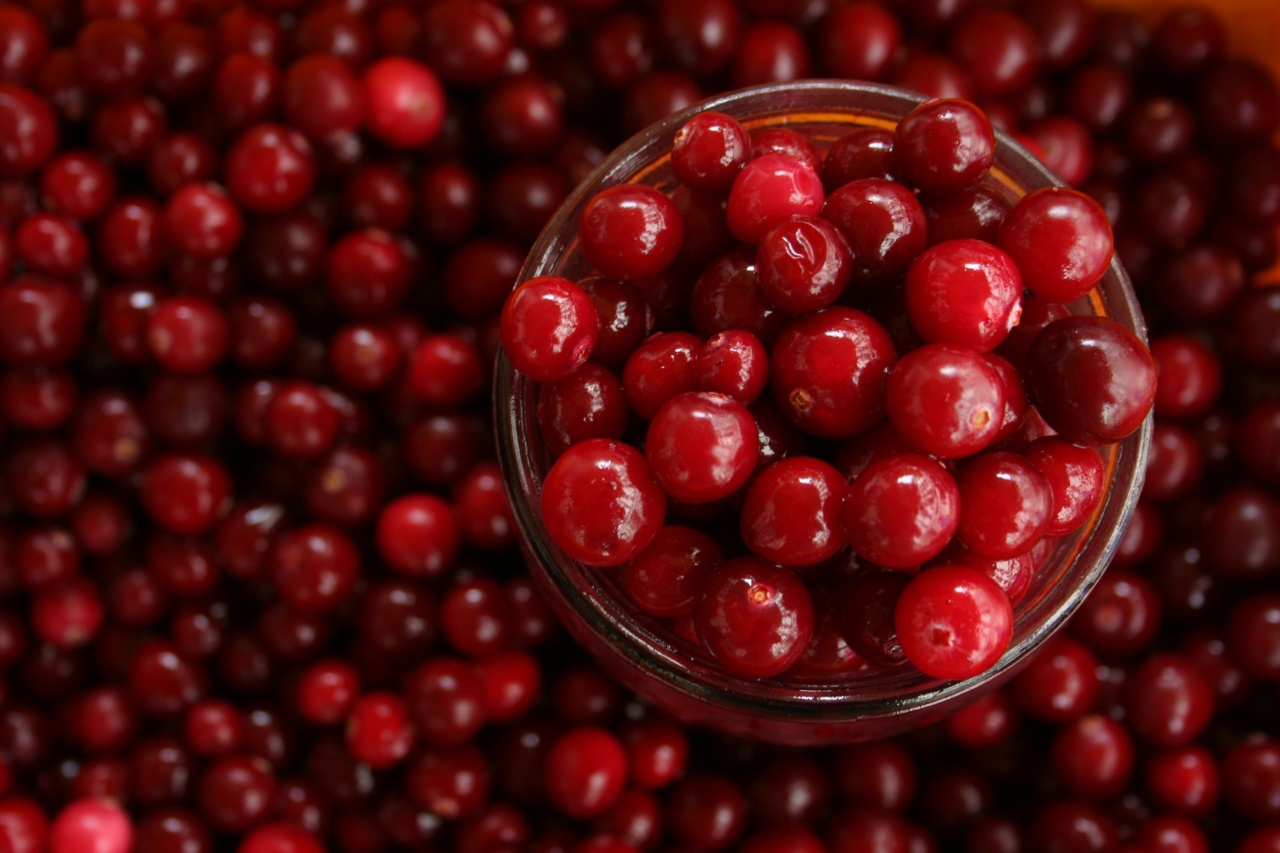The cranberry, also known as Vaccinium macrocarpon, is a small, evergreen shrub native to North America. These red berries have gained immense popularity over the years due to their numerous health benefits and unique tart flavor.
Cranberries are not only delicious but also packed with essential nutrients, making them an excellent addition to a well-balanced diet.
The Power of Antioxidants
Cranberries are renowned for their high antioxidant content. Antioxidants are compounds that help protect our bodies from oxidative stress and damage caused by harmful free radicals.
These free radicals can contribute to various health problems, including heart disease, cancer, and aging.
One of the key antioxidants found in cranberries is called proanthocyanidins (PACs), which have been shown to have anti-inflammatory and antibacterial properties.
These compounds help prevent certain bacteria, such as E.coli, from adhering to the walls of the urinary tract, making cranberries an effective remedy for urinary tract infections.
Additionally, the antioxidant power of cranberries may also play a role in reducing the risk of chronic diseases, such as cardiovascular disease and certain types of cancer.
Boosting Digestive Health
Cranberries are a great source of dietary fiber, which is essential for digestive health. An adequate intake of fiber promotes regular bowel movements, prevents constipation, and maintains a healthy gut microbiome.
Furthermore, the fiber found in cranberries helps nourish the beneficial bacteria in our gut, known as probiotics. These probiotics play a crucial role in supporting overall digestion and enhancing nutrient absorption.
Protecting the Immune System
Cranberries are packed with immune-boosting nutrients and compounds that help fortify our body’s natural defense system.
They are an excellent source of vitamin C, which is known for its crucial role in supporting immune function and fighting off infections.
The antioxidants present in cranberries also aid in reducing inflammation and strengthening the immune response. Regular consumption of cranberries may help protect against common infections like the cold and flu.
Heart-Healthy Benefits
Several studies have indicated that cranberries may have significant benefits for heart health. The antioxidants in cranberries help lower the levels of LDL cholesterol (often referred to as “bad” cholesterol) in the body.
High LDL cholesterol is a major risk factor for heart disease.
Cranberries also contain flavonoids, particularly a subclass called anthocyanins, which promote heart health by reducing blood pressure and improving blood vessel function. These effects help lower the risk of hypertension and cardiovascular diseases.
Anti-Aging Properties
With their high antioxidant content, cranberries can help slow down the aging process. Antioxidants protect our skin cells from damage caused by free radicals and environmental stressors, such as UV radiation and pollution.
Furthermore, cranberries are a good source of vitamin E, an essential nutrient for maintaining healthy skin. Vitamin E helps moisturize the skin, reduce the appearance of wrinkles, and promote a youthful complexion.
Managing Diabetes
Cranberries have been shown to have potential benefits for individuals with diabetes. The antioxidants and fiber in cranberries help regulate blood sugar levels, preventing spikes and maintaining stability.
Some studies have indicated that cranberry consumption may improve insulin sensitivity and reduce the risk of developing type 2 diabetes.
However, it is important to note that cranberries should be consumed in moderation as part of an overall balanced diet for optimal benefits.
Enhancing Brain Health
As we age, cognitive decline and neurodegenerative diseases become more prevalent. Cranberries offer neuroprotective properties that may help combat these conditions.
Some studies suggest that the antioxidants in cranberries can help reduce oxidative stress and inflammation in the brain, thus potentially delaying age-related cognitive decline.
Moreover, cranberry consumption has been associated with improved memory and a reduced risk of neurological disorders, including Alzheimer’s disease.
Supporting Weight Loss
If you’re aiming to shed a few extra pounds, cranberries can be a valuable addition to your weight loss journey.
These berries are relatively low in calories but packed with flavor, making them a satisfying choice for healthy snacks or added to various dishes.
Furthermore, cranberries are high in fiber, which helps promote feelings of fullness and prevents overeating. Including them in your diet can assist in weight management by controlling hunger cravings and reducing overall calorie intake.
Easy Ways to Incorporate Cranberries into Your Diet
There are numerous delicious ways to enjoy the health benefits of cranberries. Here are a few ideas to help you incorporate them into your diet:.
– Add dried cranberries to your morning oatmeal or cereal.
– Make a homemade cranberry sauce to accompany your favorite meats.
– Toss fresh or frozen cranberries into smoothies for a tangy twist.
– Sprinkle dried cranberries on top of salads for added flavor and texture.
– Bake cranberries into muffins, bread, or cookies for a fruity burst.
Get creative and experiment with different recipes to find new ways to enjoy cranberries!.
Conclusion
Cranberries are more than just a delicious fruit – they are a nutritional powerhouse with a wide array of health benefits.
From supporting heart health and strengthening the immune system to improving digestion and enhancing brain function, cranberries have earned their title as a super fruit. Whether enjoyed fresh, dried, or incorporated into various recipes, cranberries are a versatile and nutritious addition to any diet.
Discover the impressive health benefits of cranberries, a super fruit packed with antioxidants, fiber, and essential nutrients. Learn how cranberries can boost your immune system, protect your heart, improve digestive health, and promote healthy aging.





























